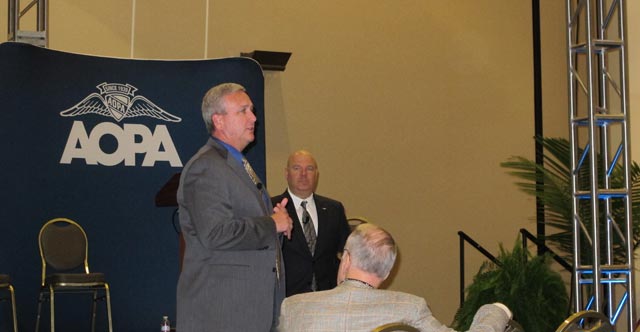
AOPA Vice President of Regulatory Affairs Rob Hackman (left) and EAA’s Doug Macnair gave pilots an update on the associations' request for an exemption that would allow some pilots flying recreationally to have an alternative to the third class medical.
If you missed the public comment window on a request from AOPA and the Experimental Aircraft Association that would reduce the burden of the third class medical, there’s still an opportunity to make your voice heard, the two associations told attendees at AOPA Aviation Summit Oct. 13.
The comment function on the regulations.gov website is still working, and the FAA will normally consider comments submitted past the deadline until it is ready to move on an issue, AOPA Vice President of Regulatory Affairs Rob Hackman said in a presentation with EAA’s Doug Macnair at the Learning Pavilion. The upcoming election, and the absence of a full-term FAA administrator, will likely delay the FAA’s response; the associations are not expecting anything until the end of the first quarter of 2013 at the earliest, Hackman said.
The decades-long effort to reduce or eliminate the cost and complexity of the third class medical is a marathon, Hackman said, but this latest push is a sprint stage. While pilots cannot expect an immediate response from the FAA, the two associations’ effort has kept the issue of the third class medical in front of the FAA, he added.
The cost of a medical certificate—in time and money—varies from pilot to pilot, but imposes an additional burden on pilots flying recreationally. Special issuance certificates can impose an even greater burden. Most of the people who complete the special issuance process get their medical certificate, but at a cost; and the process sometimes requires testing beyond what a treating physician wants to verify a patient’s health.
The AOPA/EAA request would allow pilots flying recreationally to have an option to obtain a third class medical or participate in a free, recurrent online training program and follow certain restrictions. More than 16,000 comments have been submitted to the docket.


